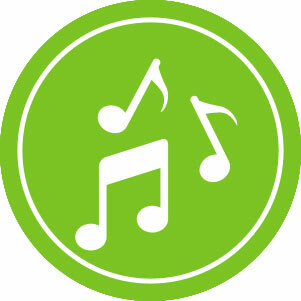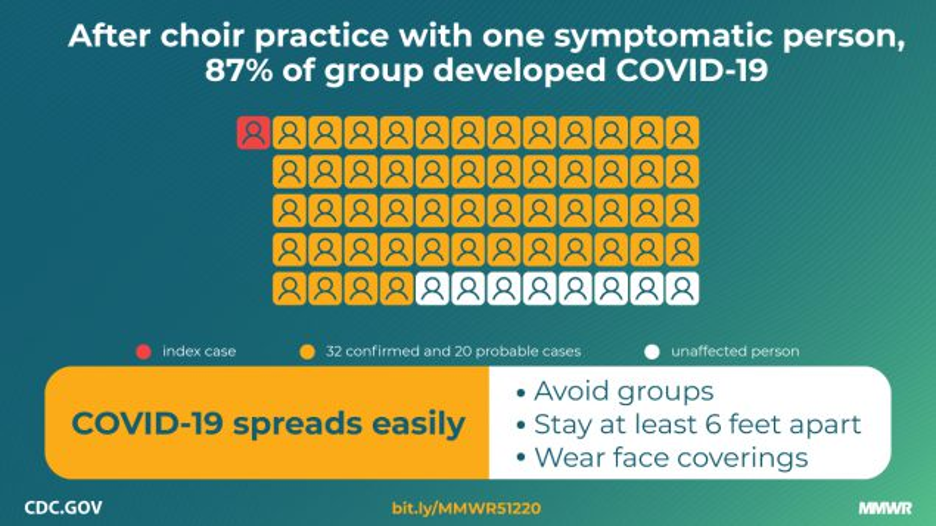
02.09.22 | Covid-19 Resources
In the words of the Ecumenical Consultation of Protocols for Worship, Fellowship, and Sacrament (based at Emory University’s UM affiliated Candler School of Theology in Atlanta, a consulting team to the CDC): “The latest CDC guidance for masks and (physical) distancing is for what individuals can do...not what Congregations, in which both vaccinated and unvaccinated people gather together, should do. We are one body in Christ, no more protected than the least protected among us. When we are among those who may be unvaccinated, we recommend being as the unvaccinated for the sake of the unvaccinated -- for their safety and to avoid stigmatizing them. In concrete terms, whenever we gather in groups that may include unvaccinated people, we continue to recommend that all wear masks, that households remain six feet apart, and that congregational and choral singing be avoided indoors.” The Association of Teachers of Singing concurred with the Ecumenical Consultation that “congregational singing and congregational choral singing indoors is not recommended at this time, even with vaccination.” Their options for worship INDOORS include “soloists or small ensembles of fewer than seven people IF fully vaccinated, physically distanced, and community conditions permit indoor gatherings.”
Why?
The risk for droplet transmission is high for unvaccinated choir members, soloists, and musicians playing brass and/or woodwind instruments. Given increased droplet and particle transmission when singing, reports of virus transmission during choir rehearsals/performances, and known difficulties and health risks of singing with a mask, all music production guidelines are still relevant for unvaccinated persons.

When?
Until CDC guidelines are revised.
Virtual Music-Making Considerations
Some considerations for those who are assembling or are thinking of assembling to create music virtually:
- Guidelines for numbers of people in the sanctuary are determined by local and state governmental directives based on the status of COVID-19 cases in each jurisdiction. Within the BWC, this includes Maryland, West Virginia, and the District of Columbia.
- No masks are currently safe for singing. N95 masks must be fit-tested first. They also decrease the singer’s oxygen levels due to rebreathing expired carbon dioxide and increasing levels (in the body). This is risky for people with asthma, COPD, and heart disease.
- Humming, even with a mask, is not a viable alternative to singing normally; aerosolized particles are still released through the nostrils and around the edges of the mask.
Cleaning Instruments Checklist
- Pianos and organs may be used in worship; however, the musicians must sanitize their hands before and after playing.
- When cleaning these instruments, please note:
- Generally speaking, a soft disposable towel, using warm water and hand/dish soap is safe to use on virtually every finish, key, and case parts.
- Always follow up with a dry soft disposable towel to remove any standing liquid.
- Cleaning pianos is a gentle process not a scrubbing process. Pressing hard or vigorously scrubbing may lead to scratching or removing the finish.
- If you use an alcohol-based disinfectant (do not use products containing bleach or citrus) put the disinfectant on the towel, not directly on the piano.
- Never leave any liquids on the keys.
- Case parts finishes vary greatly and can easily be cleaned with disinfectant wipes and sprays. A soft disposable towel, using warm water and hand/dish soap is safe to use on virtually every finish, key, and case parts. Always follow up with a dry soft disposable towel to remove any standing liquid.
- Remember to wash your hands after you have thrown away the towels.
Additional Resources
- Resources for Choral Professionals during a Pandemic
- Singing, the Church and the COVID-19: A Caution for Moving Forward in Our Current Pandemic
- High SARS-CoV-2 Attack Rate Following Exposure at a Choir Practice — Skagit County, Washington, March 2020
